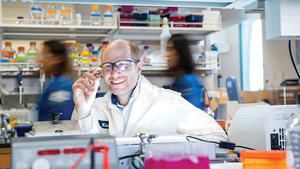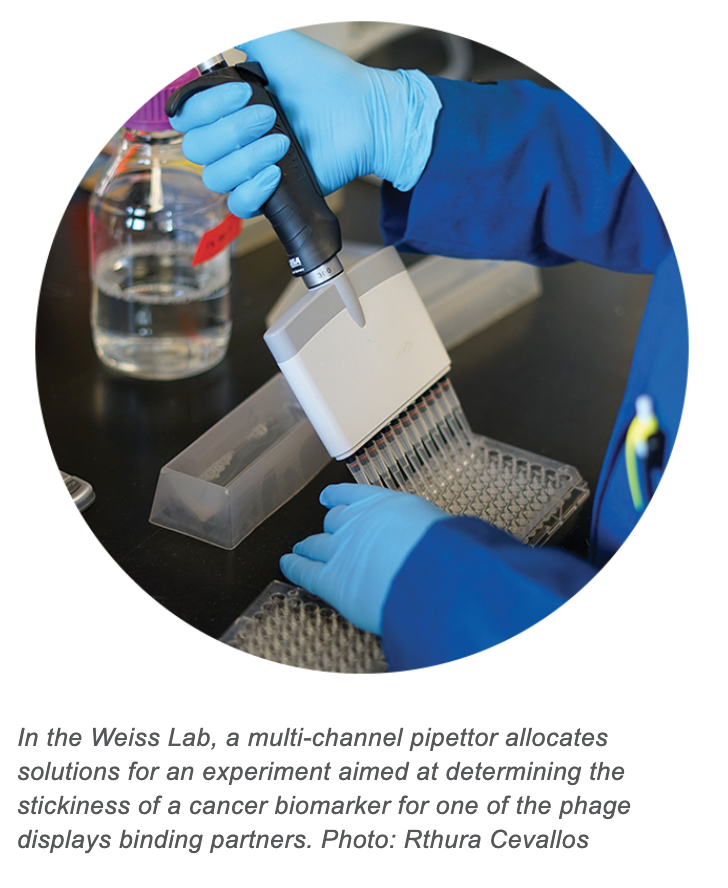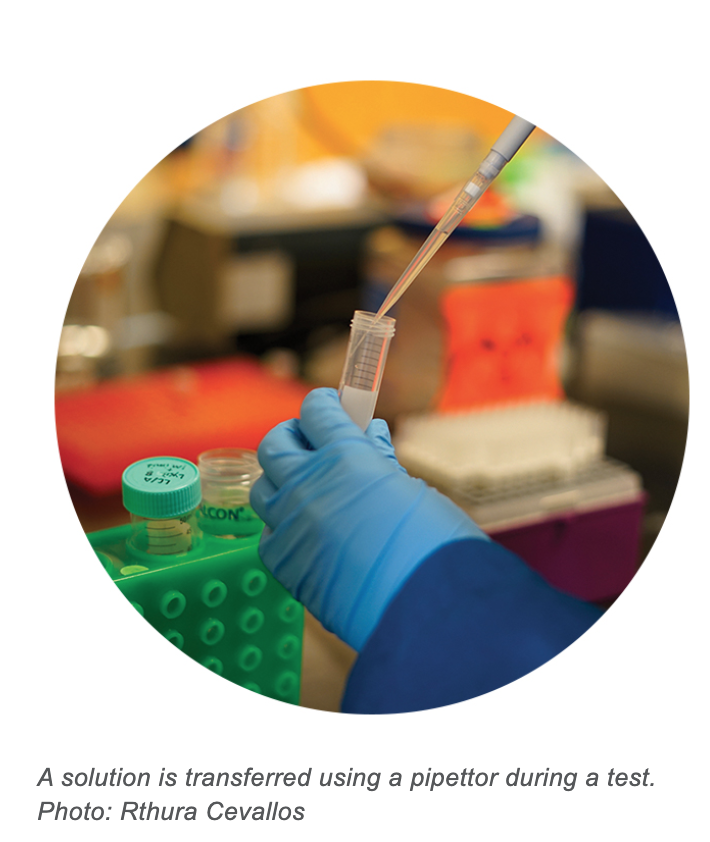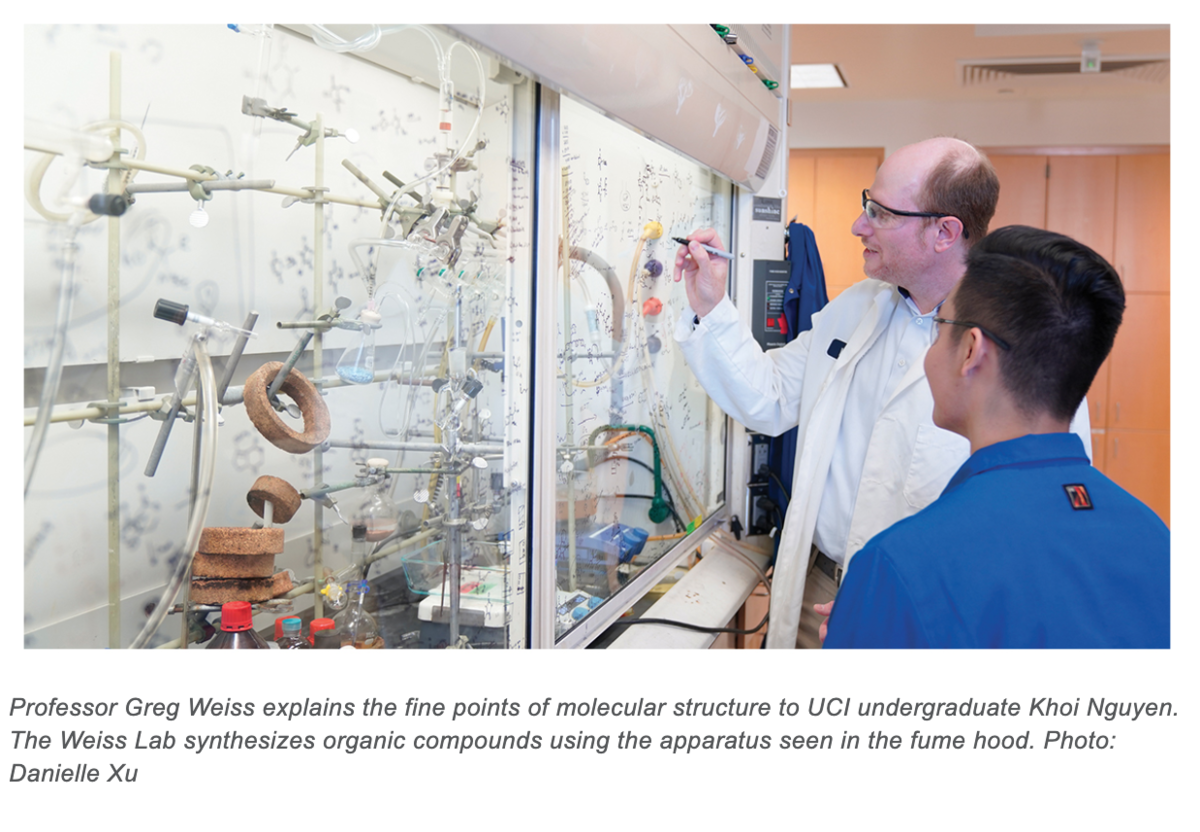Greg Weiss Lets Never-ending Curiosity Drive his Research and Commercial Goals

Professor Greg Weiss taking a closer look in the Weiss Lab at UC Irvine.
Organic chemistry focuses on the study of the structure, properties, composition, reactions and synthesis of organic compounds that contain carbon. Any structure, object, material and more can be analyzed using organic chemistry and Greg Weiss loves it.
Weiss, UC Irvine (UCI) professor of chemistry, can light up a room when talking about organic chemistry. Despite his appointments in not only chemistry, but also molecular biology, biochemistry and pharmaceutical sciences, Weiss is an organic chemist at heart.
“It gives you a set of goggles that you put on and you never see the universe the same way again,” said Weiss. “And it lets you answer questions about our world that are really fascinating, so it’s endlessly enjoyable.”
While calling out the organic polymers in common office furniture at UCI Beall Applied Innovation, Weiss is forever investigating and determining molecular interactions of many impactful structures by breaking all things down to the molecular level with an endlessly curious state of mind.
“I want to know how molecules interact with each other, what causes them to do the things they do, and how to make things better,” said Weiss. “That process will never get boring to me, and will keep me running to work forever.”
Once set on a track heading toward medical school, essentially following in his father’s footsteps, his path quickly shifted during his undergrad years at UC Berkeley, where he discovered his passion for organic chemistry.
“I was trying to decide what to do with my life and I was pretty much set on going to medical school,” said Weiss. “My father was a physician and would just radiate with joy every time we walked into a hospital.”
From a young age, Weiss grew up around hospitals. His father admired the hospital activity and made sure that benign hospital visits were a part of their lives, even during their family vacations.
“I disliked the smell of hospitals and I also started to realize that I’m not the person who likes sick people all that much,” said Weiss. “But fortunately, at Berkeley, I was taking an organic chemistry class and found my professor so inspiring that I couldn’t wait to learn more about this topic.”
After his undergraduate work, Weiss fed his passion for organic chemistry and moved on to Harvard University to receive his Ph.D. in Chemistry in 1997. Afterwards, Weiss pursued his post-doc studies at Genentech, a biotech company that follows groundbreaking science to develop medicine for people with life-threatening diseases.

From UCI to Irvine: PhageTech, Inc.
In July of 2000, Weiss arrived at UCI and spent nearly 20 years teaching his passion to students and getting them excited over organic chemistry. During this time, it’s no surprise that Weiss has taken several research students under his wing and, with their help, co-founded several UCI-based startup companies.
In 2013, he co-founded PhageTech, Inc., a startup company now based in Irvine that applies an innovative approach to detecting disease markers in body fluids, which include urine and blood.
“I think working with Dr. Weiss was one of my best experiences,” said Jeffrey Briggs, research scientist at PhageTech Inc. “It shaped my career goals and ambitions and really opened my eyes as to what you can do as a researcher. It also showed me what kind of research opportunities are available for undergrads at UCI.”
Originally, Weiss’ passion with PhageTech was spurred by his wife, who was diagnosed with cancer. During the lengthy and wearing treatment process, Weiss realized the test’s turnaround times were costing his wife and him valuable time.
“During that wait, you’re just stressed out of your gourd and very on edge just waiting and waiting,” said Weiss. “I really imagine a future where patients go in, the physician immediately collects some samples and then boom, the data’s right there, the physician knows exactly what to do next without waiting and going through central labs. That’s my dream.”
This experience sparked a collaboration in the Weiss Lab at UCI between Weiss and Reg Penner, UCI chancellor’s professor of chemistry, where the two invented a new way of building polymers using phage display technology. In this technology, phage, which are harmless viruses that only infect bacteria, are evolved to grab onto disease-associated proteins, such as cancer biomarkers.
PhageTech applies phage display to diagnostics for recurrent bladder cancer and potentially many other diseases. Specifically, the team incorporates the phage into a special type of plastic casing and electricity is sent through them. If the phage have grabbed onto something, it changes both the electrical properties, including resistance and the capacitance, of that material.
“We can detect things in 60 seconds or less, which is incredibly fast for detectors,” said Weiss. “Think about a pregnancy test, right? That’s been incredibly optimized for decades and it’s still an excruciating wait for everyone who does one. It takes a while for the molecules to bounce their way down to the surface and we found a way around that, basically.”
The result is a significant reduction in testing turnaround time for diseases like cancer. Instead of waiting weeks to hear from the doctor, a patient might know their test results within a few minutes based on a simple urine test.
From UCI to San Diego: Debut Biotechnology, Inc.
In 2019, Weiss and a UCI student researcher also co-founded Debut Biotechnology, a startup based on his lab’s technology that incorporates continuous flow manufacturing of pharmaceuticals, alcoholic beverages and cannabis.

“Having Greg Weiss as a Ph.D. supervisor is a unique, once-in-a-lifetime opportunity,” said Joshua Britton, CEO of Debut Biotechnology, Inc. “To receive great mentorship while being given the freedom to chase an area in chemical biology in which you are passionate about is rare. The most impressive aspect of Greg is the ability to turn research into a profitable company. The amount of research commercialized by Greg is staggering and I’m proud to be a part of that.”
The startup utilizes Weiss’ protein immobilization technology to immobilize proteins into continuous systems to improve the ways of creating pharmaceutical drugs. By utilizing easy-to-use enzyme cartridges, complex pharmaceuticals are created using only cells.
“Enzymes are like magic fingers in biology,” said Weiss. “They take chemicals in and they massage them and transform them into something else. Without enzymes, no organism would be alive.”
This allows the creation of alcohol in minutes and the manufacture of cannabinoids without using the plant. This technology also allows proteins used in pharmaceutical synthesis to work quicker, with better stability and in more suitable ways. Debut’s market applications include protein therapeutics, alcoholic beverages, pharmaceuticals and cannabinoids.
“When starting Debut Biotechnology, Greg never questioned the final goal and continues to provide support on a daily basis,” said Britton. “If you manage to be a part of the Weiss team, there is a good chance you will end up a CEO, and that’s fantastic.”
In addition to licensing the technology to Debut Biotechnology, Weiss has utilized connections through UCI Beall Applied Innovation’s investor network.
“Applied Innovation has been awesome,” said Weiss. “They brokered meetings with potential companies that are interested in the technology, introduced me to investors, and basically helped provide some oxygen to keep these things going. They really work hard on behalf of faculty.”
Wearing Multiple Hats
With PhageTech off and running at solid speed in the city of Irvine and Debut Biotechnology kicking up dust in San Diego, the busy professor also continues to pursue his research, and teach and inspire students while progressing both startups and, like his passion for organic chemistry, he loves it.
“It’s real. I like to talk about technology in terms of its usefulness, but in the startup world, you find out whether that’s true or not, whether there really is a market for what you’re talking about or if the technology really does have a chance to impact society,” said Weiss. “I like that.”
Find out the latest research in the Weiss Lab.

